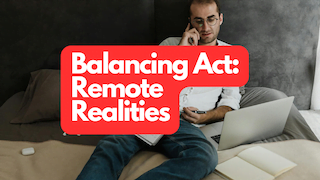In the ever-evolving kingdom of remote and hybrid work, the concept of a twofold commitment has emerged as both a beacon of flexibility and a harbinger of potential burnout.
With the advent of remote work, individuals have found themselves at the crossroads of work and family life, striving to strike a delicate balance between professional responsibilities and personal obligations.
Initially, the allure of remote work seemed promising, offering the prospect of harmonizing work and family commitments. Men and women alike embraced this newfound flexibility, believing it to be the solution to the age-old struggle of juggling career aspirations with familial duties. However, as the dust settles, it becomes evident that the twofold commitment, while initially appealing, may not be sustainable in the long run.
The appeal of productivity gains from remote work may entice employers, but the toll it takes on employee well-being cannot be overlooked. The blurred boundaries between work and personal life can lead to burnout, absenteeism, and decreased productivity in the long term. Despite the convenience of remote work, the traditional drawing of work hours, commute time, and leisure activities has been disrupted, leaving many employees feeling overwhelmed and overworked.
In this shifting landscape, gender dynamics come into play, with women often bearing the brunt of balancing work and family commitments. While both men and women aspire to the twofold commitment, women, in particular, find themselves dedicating more time to work while still shouldering the bulk of household responsibilities. This imbalance underscores the need for a nuanced approach to remote work that acknowledges and addresses the unique challenges faced by different demographics.
Moreover, the lack of in-person interaction in remote work settings poses challenges for employers in gauging employee productivity and well-being. Regular communication and feedback mechanisms become essential to bridge this gap and ensure that both parties are satisfied with the arrangement.
Amidst the demands of remote work, it is imperative for individuals to prioritize self-care and relaxation. Engaging in activities such as mindful meditation, short walks, and unplugging from social media can help alleviate stress and maintain a sense of balance in a twofold commitment scenario.
As the trend towards a return-to-office gathers momentum, the stigma associated with requesting flexible work arrangements may persist. However, advocating for a twofold commitment that aligns with individual priorities should be viewed as a valid choice rather than a detriment to professional success.
Ultimately, successful navigation of the twofold commitment hinges on clear communication, mutual understanding, and a commitment to maintaining boundaries. By fostering a culture of respect and flexibility, organizations can empower employees to thrive in both their professional and personal spheres, redefining success in today’s overworked world.
